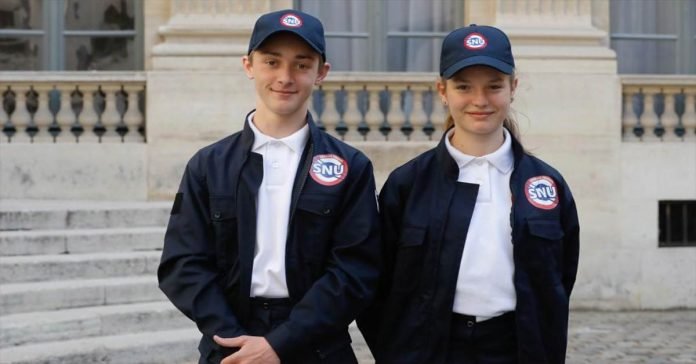Two decades after France ended conscription, the government has launched a program targeting young people.
The government is hoping to “increase the cohesion and resilience of the nation” with the service.
France launched a new national service, SNU, on Sunday, which will see thousands of teenage volunteers spend 10 days learning first aid, how to read maps and other key skills, reported French newspaper Le Monde.
The service – a project put forward by French President Emmanuel Macron – envisions developing patriotism and national cohesion among 15- and 16-year-old’s two decades after France ended military conscription for men.
According to the government, the program will help “develop a culture of commitment” and “increase the cohesion and resilience of the nation.” Macron said he wanted to give young people “causes to defend and battles to fight in the social, environmental and cultural domains.”
Patriotism and social cohesion
Macron has billed the service as a way to develop patriotism and social cohesion in a country battling deep divisions between left and right, rich and poor, and religious and non-religious.
France requires all citizens to participate in a one-day “Defence and Citizenship” course when they turn 18, which includes a presentation of the country’s military forces and a French language test.
Macron is the first French president not to have been called up to serve, having come of age after the compulsory 10 months of military service for school-leaving men was abolished by ex-president Jacques Chirac in 1997.
‘Not the answer’
For the first trial run, 2,000 teenagers were chosen out of 4,000 volunteers, including 50 with disabilities. Later this year, they will spend an additional two weeks working on a local project. In the future, the government would like to expand the program to eventually target some 800,000 young people per year.
According to an IFOP survey, the initiative is supported by some 74% of the country. However, some have questioned whether two weeks is sufficient to establish societal cohesion among young people.
“We agree with the government’s findings on the lack of social diversity, but we think that the SNU is not the answer,” Orlane Francois, who heads a student union, told AFP news agency.
Two weeks in barracks, it can seduce a part of the population nostalgic for military service, but not young people who are the ones affected by it.
Support Independent Journalism Today
Our unwavering dedication is to provide you with unbiased news, diverse perspectives, and insightful opinions. We're on a mission to ensure that those in positions of power are held accountable for their actions, but we can't do it alone. Labour Heartlands is primarily funded by me, Paul Knaggs, and by the generous contributions of readers like you. Your donations keep us going and help us uphold the principles of independent journalism. Join us in our quest for truth, transparency, and accountability – donate today and be a part of our mission!
Like everyone else, we're facing challenges, and we need your help to stay online and continue providing crucial journalism. Every contribution, no matter how small, goes a long way in helping us thrive. By becoming one of our donors, you become a vital part of our mission to uncover the truth and uphold the values of democracy.
While we maintain our independence from political affiliations, we stand united against corruption, injustice, and the erosion of free speech, truth, and democracy. We believe in the power of accurate information in a democracy, and we consider facts non-negotiable.
Your support, no matter the amount, can make a significant impact. Together, we can make a difference and continue our journey toward a more informed and just society.
Thank you for supporting Labour Heartlands









